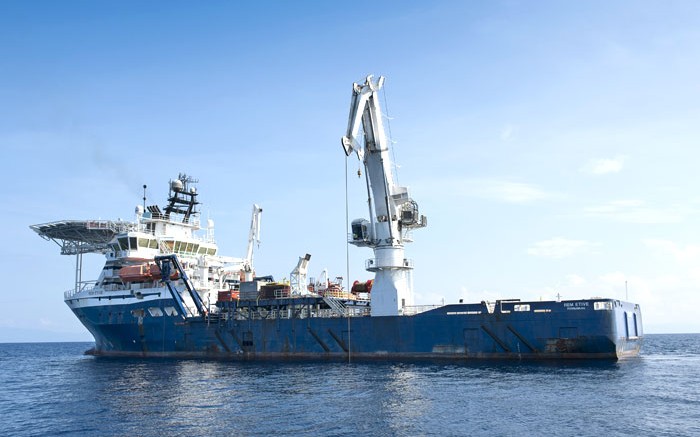VANCOUVER — In 2011 it looked like Nautilus Minerals’ (TSX: NUS; US-OTC: NUSMF) pioneering plan to mine high-grade sea floor sulphide deposits might actually work. The company had permits, a joint venture with the Papua New Guinea government, contracts with partners to build and operate the novel underwater mining machinery and lots of money from excited investors.
Then the PNG government failed to pay its share of project costs, and Nautilus’ momentum ground to a halt.
In exchange for a 30% stake in Nautilus’ most advanced project, Solwara 1, the PNG government had agreed in early 2011 to pay 30% of project costs up to that point and fund 30% of future costs.
According to Nautilus, those payments just didn’t happen. Meanwhile the government says Nautilus failed to meet several contractual obligations, details of which have not been made public.
Whatever the case, by late 2012 Nautilus could no longer bear the full costs of advancing Solwara 1 alone. The company halted construction of its sea floor production system, effectively putting Solwara 1 on standby. By the time it suspended construction, Nautilus says the PNG government was in arrears to the tune of $75 million.
Direct negotiations failed and the Solwara 1 partners entered arbitration. That process, which started in mid-2012, is finally wrapping up. On Aug. 26 the arbitration hearing took place. Now Nautilus has only to wait for the outcome.
Investors also seem interested in the outcome: Nautilus’ share price has doubled since early July to hover near 40¢. The rally found its footing in June, when Nautilus sold 200 million shares at 20¢ apiece, for gross proceeds of $40 million.
The company says existing shareholders filled most of the private placement, and indeed Nautilus earned a wide and varied investor base between 2008 and 2011, as its novel proposal to mine massive sulphides on the sea floor took shape. Major shareholders include Mawarid Mining, a subsidiary of Oman’s state oil, gas and mining company, with 28%; Russian iron ore and steel major Metalloinvest, with 20.75%; and Anglo American (LSE: AAL), with 5.95%.
Solwara 1 is 30 km from the coast, in PNG’s territorial waters. Underneath 1,600 metres of Bismarck Sea Nautilus has delineated 1.03 million indicated tonnes grading 7.2% copper, 5 grams gold per tonne, 23 grams silver per tonne and 0.4% zinc. Inferred resources add 1.54 million tonnes averaging 8.1% copper, 6.4 grams gold, 34 grams silver and 0.9% zinc.
Nautilus’ plan to move those mineral-rich tonnes to the surface starts with two large, robotic, continuous-cutting excavators that leave cut material sitting on the sea floor. A collecting machine follows, drawing the mixture of sand, gravel and silt in as a slurry and pumping it through a flexible pipe to the riser and lifting system (RALS).
The RALS comprises a large pump that pushes the slurry up a rigid pipe to a ship, which is known as the production support vessel (PSV). On-board the PSV the slurry is dewatered and transferred to a barge, while the used seawater is pumped back to the sea floor to avoid mixing cold, deep waters into the warm surface waters.
When Nautilus suspended construction, work on the RALS was more than half complete. In the last year some progress has been made, as Nautilus funded work on three parts of the system.
“The company considered it essential to continue with the build of its three key contracts related to the sea floor production system to ensure the company is in the best possible position to advance the Solwara 1 project following the resolution of the dispute with the State of PNG, or alternatively to allow for the redeployment of the equipment to other jurisdictions,” Nautilus wrote in its latest quarterly financials.
The three major contracts concern the sea floor excavators and collecting machine and the detailed engineering of the RALS. Nautilus has also continued work on plans for the PSV. The $40-million financing was completed to fund this ongoing work and keep the company afloat until the arbitration decision, which is expected shortly.
If the arbitration decision renders Solwara 1 unfeasible for Nautilus, the company’s investments to date will not all go to waste, as the equipment is mobile and Nautilus has other massive sulphide floor projects. The company holds 500,000 sq. km of exploration tenements in the territorial waters and exclusive economic zones of Papua New Guinea, Tonga, Soloman Islands, Fiji, Vanuatu and New Zealand, as well as 75,000 sq. km of tenements in the Clarion-Clipperton zone, in the international waters of the Eastern Pacific between Hawaii and Mexico.
Nautilus closed recently at 42¢. The company has a 52-week trading range of 20¢ to $1.15, and has 437 million shares outstanding.


Be the first to comment on "Nautilus, PNG await arbitration decision"